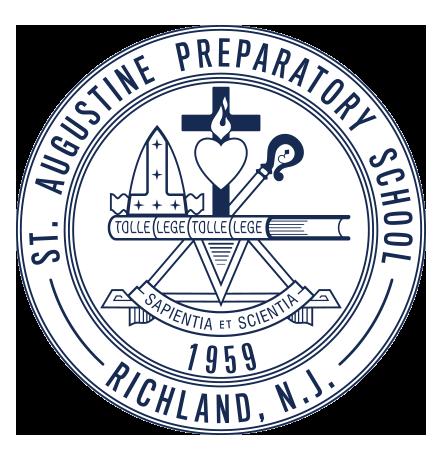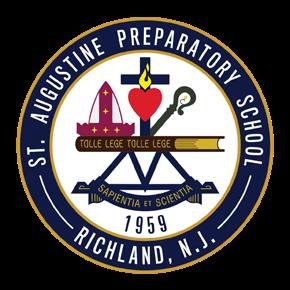ST. AUGUSTINE PREPARATORY SCHOOL





HEAD OF SCHOOL Rev. Robert J. Murray, O.S.A., Ph.D.
ASSISTANT TO THE HEAD OF SCHOOL FOR MISSION & MINISTRY Rev. Anthony P. Burrascano, O.S.A.
EXEC. ASSISTANT TO THE HEAD OF SCHOOL FOR ADMINISTRATION Dr. James Devine, Ph.D.
DEAN OF ACADEMICS Mrs. Nancy McHugh
ASSISTANT DEAN OF ACADEMICS Mrs. Norma Vogelsong
DIRECTOR OF 8TH GRADE PROGRAM Rev. Stephen M. Curry, O.S.A., Ed.D.
HUMANITIES, DIVISION HEAD Mrs. Caroline Chapman
STEM, DIVISION HEAD Mr. Sean Grealis
COUNSELING & STUDENT SERVICES, DIVISION HEAD Ms. Gabriella D’Amico
DEAN OF STUDENT LEADERSHIP & DEVELOPMENT Mr. John Huscher
ASSISTANT DEAN OF STUDENT LEADERSHIP & DEVELOPMENT Mr. Tim Hale
ADMINISTRATIVE ASSISTANT TO THE DEAN OF ACADEMICS Mrs. Rebecca Pippett
Humanities English Social Studies Logic & Civil Discourse World of Language
Theology
STEM Mathematics - Pre-Algebra Mathematics - Algebra Science


From the Desk of the Head of School

Young men who join the Prep Community in eighth grade have the distinct advantage of exploring an introduction to a Catholic, Augustinian education. Students benefit from a strong academic and co-curricular program which prepares each one of them for high school. Eighth grade students are encouraged to develop self-advocacy skills, and take risks in our learning community that values each student’s individual gifts.
The eighth grade curriculum builds upon skills acquired in previous learning experiences and provides a foundation for future success. In keeping with the Augustinian mission to nurture the whole person, the program provides a unique learning environment where students can mature, be challenged, and develop critical thinking skills. Our faculty, staff and leadership team strive to help each young man develop self-confidence, an appreciation for diverse views, respect for others and all creation.
We are delighted to share this publication with you. As you review the various facets of the eight grade educational program, you will see that St. Augustine Preparatory School continues a six decade tradition of excellence grounded in our core Augustinian values of Truth, Unity, and Love.

This course incorporates grammar, literature, speaking, and writing. Students explore literary analysis through the study of literary elements and by reading a variety of genres. Students practice analysis through essay writing, as they plan, draft, proofread, and revise using personal, peer, and teacher feedback. Students practice creative writing skills through a variety of experiences and grow through the writing process with consistent writing exercises. Students also study and incorporate concepts of grammar and mechanics to enhance the clarity and accuracy of their speaking and writing.
In the Civics component of this course, students will learn how the United States government works, study elections and voting, and utilize current events to frame and discuss issues in a civil manner. Students strengthen their academic skills by writing frequently, analyzing primary sources, reading regularly, conducting research, and participating in group activities.
In the geography portion of this course, students study humans around the world while integrating diversity awareness and an appreciation of all cultures and their contributions to society. Students explore major landforms, climates, and bodies of water. This is followed by a study of countries and population centers-- their development, standards of living, systems of government, and economics. Through the eyes of a geographer, students synthesize the patterns and interdependent relationships that make the world dynamic.
In this course (which complements the entirety of the 8th-grade curriculum) students continue to refine their communication skills, master paraphrasing, learn to detect logical fallacies, and understand how reasoning goes wrong-- critical to all academic work. Students recognize argument forms, craft effective arguments based on well-informed research, and respond to opposing viewpoints using the principles of civil discourse which include:
• Respectfully speaking with and listening to others
• Developing an appreciation and respect for the voices, talents, and perspectives of all
• Engaging in self-reflection
• Encouraging and ensuring the voices of the disenfranchised
Language (verbal and non-verbal) impacts the daily lives of every person on Earth, and through words, gestures, and tones, allows us to express our feelings, desires, and curiosity. The World of Language course studies this impact and prepares students for success in their high school world language classes. Throughout the year, students explore the origins and history of human language and are introduced to Spanish, Arabic, and Latin. In addition to linguistic lessons, students participate in cultural studies, furthering their appreciation for diversity.
Introduction to the Catholic Faith attempts to “level the playing field” for all incoming students, no matter their background, as it introduces students to the life of Jesus and the Catholic faith. The course is rooted in the teachings of Jesus, and how the Catholic Church celebrates those beliefs (LITURGY AND SACRAMENTS), how one tries to live those beliefs faithfully each day (MORALITY), and how one tries to sustain and deepen those beliefs through prayer (PRAYER). Additionally, there is an Augustinian component to the course. The Catholic Faith course is a springboard into Sacred Scripture, The Moral and Sacramental Life, and Religious Perspectives.
This course focuses on developing fluency with rational numbers and proportional relationships. To this end, students learn to think flexibly about relationships among fractions, decimals, and percents. Also, students are introduced to concepts that serve as a transition into formal Algebra and Geometry. Algebraically, students learn to recognize and generate equivalent expressions and solve single-variable equations and inequalities. Geometrically, students investigate angle relationships in parallel lines and triangles and examine the volume and surface area of cones, cylinders, and spheres. Students develop critical thinking and creativity skills by exploring mathematical relationships and developing multiple strategies for analyzing complex situations. Also, in this course, students enhance communication by analyzing situations verbally, numerically, graphically, and symbolically to grow their literacy in mathematics and to establish meaningful connections to their life experiences via modeling, collaborative problem-solving, developing viable arguments, and practicing precision of language.
In this course, students develop and refine their problem-solving and critical thinking skills. Upon entering this course, students are expected to be fluent in their ability to complete operations with rational numbers (decimals, fractions, percentages, proportions, and integers) without the use of a calculator. Algebra
1 focuses on methods to analyze and graph linear equations and inequalities, exponents, polynomials, systems of equations, multiplying binomials and polynomials, and factoring. Additionally, students investigate introductory probability, statistics, and function notation for use in future math classes. Students examine real-world applications, display creativity, and collaborate as they communicate solution strategies and present solutions to their classmates. In this course, students engage in activities that enable them to discover, understand and apply mathematical concepts.
The main goal of this course is to develop an understanding of modern science and technology through experimentation and inquiry in order to build the foundational skills for success in future science classes. With an overarching theme of a multidisciplinary approach to the vast scientific concept of “energy’’, this course embodies a student-centered approach to learning and is separated into four major topics: biology, environmental science, chemistry, and physics. In biology, the content focus is living organisms, selection and adaptation, and cellular energy. The environmental science component addresses concepts involving stability and change on Earth, human impact, and alternative energy sources. The chemistry content focus is a survey of matter, the electromagnetic spectrum as it applies to energy, the energy of reactions, and energy measurements via calorimetry. In physics, the content focus is forces and energy, the law of conservation of energy, and types of energy. In this course, differentiated activities develop skills in technical writing, scientific inquiry, data analysis, critical thinking, information synthesis, time management, and collaboration. As there is a need for strong, research-based science instruction in all levels of education, this course challenges students to generate questions, investigate, and conduct research to design solutions to solve real-world problems. Finally, the fundamentals taught throughout the year will give the students the foundation to continue deciphering the new and more complex concepts found within the ninth-grade Physics Modeling curriculum.

